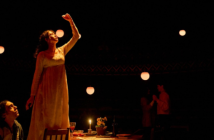Shakespeare was clever, wasn’t he? Bowling around Elizabethan London, bard-ing away, and managing to write stories that not only fit in some 400 years later, but almost certainly deserve a prime time HBO TV series. Measure for Measure is a soap opera of unquestionably modern magnitude, despite having been written in around 1604. It is one of Shakespeare’s ‘problem plays,’ which means that, despite its classification as a comedy, it is rather more complicated than that – and somewhat sinister. It also includes the perennial quandaries of which Shakespeare was so fond, namely the hypocrisy of the Church, the treatment of women and the propensity for power to corrupt.
Given the quality of the content itself, it is always a bit nerve-wracking when theatre companies try to be markedly progressive in their rendering of it, and so if I were to tell you that the Young Vic’s current production uses inflatable sex dummies and live video relays projected onto the back of the stage, or, indeed, that Alanis Morissette features at one point, you would be justified in a pointedly large intake of breath. But the whole thing is inspired. It just works. And with more ease than anything I’ve seen in a long time: director Joe Hill-Gibbons just ‘gets it’. He understands the very core of Measure for Measure, and that is a truly exciting thing to witness. This production is shrewd, powerful and hysterically funny, however improbable that sounds.
The seedy underbelly of Vienna is first introduced via said dolls, through the cascading mounds of which the cast must wade in what is an appropriately explicit portrayal of a city addled by vice. Not only is it a very funny scene used to full comic potential, it also thrusts the religious element unavoidably into your face through contrast alone, both with the virtuous novice Isabella (staggeringly played by Romola Garai) and the Bible-wielding Angelo, who takes charge when the incumbent Duke (Zubin Varla) goes into hiding.

Angelo gets all high and mighty on his new-found authority and starts enforcing the law like never before. Literally. Isabella’s brother Claudio gets arrested and then sentenced to death for having had inappropriate relations with his girlfriend, Julietta (which is a bit rich given that they’re engaged to be married, whereas loads of people are doing the same thing in brothels all over the city). Isabella beseeches Angelo to show mercy, but he is unwavering (the law is the law, mate) until her cleverly worded begging starts to get him hot under the collar and then – this is the juicy bit – he hypocritically agrees to spare Claudio’s life provided she sleeps with him, which is asking her to essentially sell her soul. Apparently a woman’s sexuality is simply up for grabs, whereas men have ownership of theirs – whether they choose to use it legally, morally or not.
Garai is an absolute force as Isabella, her fresh-faced honesty in the part making it incredibly moving. It doesn’t always ring true to see such a puritanical character start to use the sexual rhetoric that Isabella does when imploring Angelo not to make an example of Claudio (she starts talking about kinky stuff like whips and chains), but Garai’s Isabella does it both knowingly and reluctantly – a necessary and low-grade evil to save her brother with entirely unpredictable consequences. The simple staging marks out a boxing ring for the two to spar in, and Isabella has an ally on the sideline coaxing her on throughout the match. Later, she and Angelo practically descend into wrestling – jostling for power in terrifyingly murky moral waters. Isabella’s outrage, her bewilderment, her despair, are incredibly affecting, and Garai does a sterling job, particularly in the denouement when she is called upon by poor Mariana to save Angelo, after everything: that’s what you call acting. Meanwhile, Paul Ready as Angelo is a clean-shaven, closeted weasel. Calm and quiet, he hands out cruelly severe punishments with a patronizing air, which is all the more infuriating when his own scruples skew.
Varla’s Duke has the maniacal air of a drug addict gone cold turkey once he leaves office – whether that’s an addiction to actual drugs (a bong features in the prison) or to power, it’s hard to tell – but his face takes on an unmistakably sweaty, nervous pallor. His weariness at Vienna’s debauchery (shown initially as him coming to the end of an all-night party) turns to confusion and anger and he flits between a benevolent and then officious father-figure trying to sort out his subjects’ mess.

The videography is stunning, making the whole thing seem like a siege. At times farcical and at others simply thrilling, the antics behind the prison doors are projected onto the stage with facial close-ups that offer a proximity and rawness not often achieved on the stage. One interesting trick is making Escalus female. As the Duke’s, and therefore Angelo’s PA, it becomes apparent that she is the one who sorts everything out, and using her as this influential voice of reason makes a startling statement about women – they are the only ones with any sense in the play, and yet, mostly, treated as mere pawns in a game.
Measure for Measure at the Young Vic Theatre, 66 The Cut, Waterloo, London SE1 8LZ, until 14th November 2015. Running time approximately 1 hour 55 minutes with no interval. For more information and tickets visit the website.




